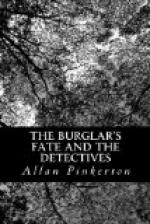“Do the people in the house know where he is?” inquired Vinton.
“I don’t think they do,” answered the girl, “and they are very much worried about him. There was a letter came from some one the other day, and ever since that time Mrs. Andrews has been in great trouble. She does not tell me anything about it, but I think it is about her brother.”
“That’s very strange, isn’t it?”
“Yes, and what is more so,” answered the girl, “for several days past there have been several men about the neighborhood who are strangers, and Mrs. Andrews is very much frightened about it. She is afraid to go out of the house, and seems almost afraid to move.”
“Does she think they have anything to do with her?” asked Vinton, surprisedly.
“Oh, I don’t know about that; but it is a very unusual thing to have strange men loitering about our neighborhood, and she feels very nervous about it.”
Vinton expressed his profound sympathy for the unfortunate family, and without hinting any suspicion that anything of a criminal nature had occurred, he parted from the young lady and returned to his home.
A few evenings after this, Vinton again called upon Mary Crilly, and while he was conversing with her, Mrs. Andrews came into the room.
“Mr. Vinton,” said she, “before you go, I want to give you a couple of letters to post for me, if it is not too much trouble.”
“Certainly not,” he replied, “anything I can do for you, Mrs. Andrews, will be cheerfully done by me, I assure you.”
“Thanks,” said the lady, “I will have them ready before you leave, and would like to have them posted this evening.”
“I will attend to it, madam,” said Vinton respectfully.
After passing a pleasant hour with Mary, Mrs. Andrews returned, and handed Vinton two letters which he placed in his pocket without looking at the addresses, a proceeding which he noticed gave Mrs. Andrews some degree of pleasure. After a few moments’ further talk he took his leave, and hastened to the agency. Here he was fortunate enough to find my son William, and he immediately produced the two letters and laid them upon the desk.
“I don’t know whether there is anything in these or not,” said he, “but I thought I had better let you see them.”
William took up the two envelopes, and looked at their addresses. With a start of surprise, he read the superscriptions. One of them was addressed to “William Amos, McDonald, New York,” and the other to “Newton Edwards, Denver, Colorado, care Windsor Hotel.”
Here was a dilemma! Could it be possible that Newton Edwards, knowing that the detectives were upon his track, would continue to use his own proper name, and have letters addressed to him in that open manner? This was certainly a most foolhardy thing for a sensible man to do, who was seeking to evade the officers of justice. Was it not more reasonable to think that Mrs. Andrews, taking alarm at the possibility of the actions of herself and family being watched, and being fully aware of the crime her brother had committed, would be advised to direct her letter to him under an assumed name?




